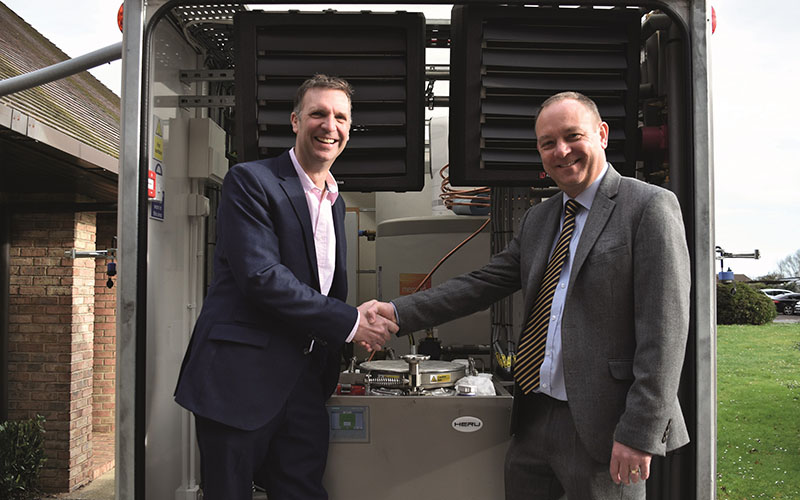The resource becomes char, releasing oil and gas, which are captured. The HERU cleans the oil, so it is safe to discharge and it utilises the gas and heat that’s been produced together with a domestic boiler.
A single cycle of the HERU can produce a 30°C temperature rise for around 70 to 120 litres of water a day, which is equivalent to a full bath.
The trials, which have been co-funded by Worcestershire County Council, will see the HERU tested at three distinct sites with three distinct types of ‘fuel’:
- Hillers Farm Shop: Commercial food and packaging
- Rugby Borough Council: Domestic housing resources
- Wychavon District Council: Office materials
The trial at Wychavon has now commenced, to be followed by units at Hillers Farm Shop and Rugby Borough Council. Lasting approximately ten months, the units will be monitored remotely in real time, in order to assess progress around energy efficiency, usability and qualification criteria for the Renewable Heat Incentive for cardboard, paper, food and garden trimmings.
Nik Spencer, Founder and Inventor of the HERU, comments, “After hundreds of hours of rigorous testing at our engineering facility, where we basically tried our best to break it and find its weak points, testing all materials produced in the home. It’s exciting to now test the HERU in real-life scenarios and the data and feedback we get from these trials will mean we can take the final steps in bringing this innovative product to market.”
As well as being an innovative greentech solution, the HERU can also help users save up to 15% on fuel bills, assisting in the fight against fuel poverty for those most in need.
Cllr Carolyn Robbins, Rugby Borough Council, Portfolio Holder for Corporate Resources, said: “We’re delighted to support the trials of the HERU by installing a unit at one of our sheltered housing schemes. This ground-breaking invention has the potential to benefit both the council and our tenants by driving down the cost of fuel bills and reducing our carbon footprint.”
Not just for use in homes, the HERU team are also looking at how the machine tackles commercial input too.
Vic Allison, Deputy Managing Director for Wychavon District Council, said: “We are looking forward to the technical trial at Wychavon’s offices which will help to take the HERU to the next stage. We are keen to help make the HERU a commercial reality, bringing environmental benefits to us all.”
What about organic matter, such as left-over food? The HERU can recycle that into energy and are working with Warwickshire-based Hillers Farm Shop, to ensure the HERU works well in this commercial environment.
Emma Taylor, from Hillers, added: “We are delighted to be involved with trialing the HERU at our restaurant. As with any restaurant, we have food and packaging that often becomes waste, which is something we are continually trying to reduce. Having the HERU on site will massively prevent this resource from becoming waste in the first place.
“We are also keen to see less need to send away our recyclable items, so having a HERU on site will be incredibly valuable. We are extremely excited to benefit from the energy that will be produced by the synchronisation to power our boiler and therefore the provision of free hot water. We look forward to being part of this incredible innovation.”
With financial support for the trials coming from Worcestershire County Council’s Low Carbon Opportunities Programme, Ruth Corrall, Programme Manager, commented: “Our business support programme, funded by the European Regional Development Fund, aims to help innovators bring low carbon, clean technologies to market. We were therefore delighted to support the development of the HERU in its trial phase. We hope that the trials will be successful and to see this technology adopted in homes and businesses very soon.”
Nik Spencer, said: “This disruptive technology is providing a completely new way of stopping waste arising, putting the decision to generate energy and reduce energy bills back into the hands of households and businesses.”








